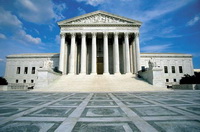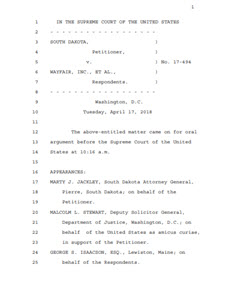The U.S. Supreme Court on Tuesday heard oral arguments on a long-awaited case (South Dakota v. Wayfair, Inc., No. 17-494 ) that addresses the constitutionality of states' authority to collect sales and use taxes on Internet consumer purchases from retailers who do not have a physical presence in a state.
 |
The U.S. Supreme Court heard oral arguments on a long-awaited case (South Dakota v. Wayfair, Inc., No. 17-494 ) that addresses the constitutionality of states' authority to collect sales and use taxes on Internet consumer purchases from retailers who do not have a physical presence in a state. |
The Wayfair case challenges two pre-Internet Supreme Court decisions from 1991 and 1967 (Quill Corp. v. North Dakota, 504 U.S. 298, and National Bellas Hess, Inc. v. Department of Revenue of Illinois, 386 U.S. 753, respectively). This pair of decades-old opinions exempts many internet merchants from collecting billions of dollars in sales taxes. The U.S. Government Accountability Office (GAO) estimates that state and local governments could have collected an estimated 8 to 13 billion dollars in 2017 if states were given authority to require sales tax collection from all remote sellers. (GAO report, Dec. 18, 2017).
During this week's oral argument on Wayfair, the nine justices offered divided views. For example, Justice Elena Kagan commented, "Congress is capable of crafting compromises and trying to figure out how to balance the wide range of interests involved here." Justice Sonia Sotomayor added, "Is there anything we can do to give Congress a signal it should act more affirmatively in this area?" (CQ, April 17)
Three justices – Neil Gorsuch, Clarence Thomas and Anthony Kennedy - have expressed a willingness in past writings to rethink the Court's case law in this area. On Tuesday, Justice Ruth Bader Ginsburg suggested now is the time for the Quill ruling to be corrected. Ginsburg asked, "If time and changing conditions have rendered it obsolete, why should the court which created the doctrine say, 'Well, we'll let Congress fix up what turns out to be our obsolete precedent?'" (Reuters and Wall Street Journal, April 17 / AP, April 18)
Justice Stephen Breyer also noted, "When I read your briefs, I thought absolutely right. And then I read through the other briefs, and I thought absolutely right. And you cannot both be absolutely right." (Bloomberg Law, April 17)
 |
During the Supreme Court's oral argument on Wayfair , the nine justices offered divided views. See transcript . |
Throughout decades of congressional efforts, legislation to level the tax playing field between Internet-based retailers and "brick and mortar" stores has never passed both chambers. More recently, President Trump has signaled his support for legislation authorizing states to impose sales tax collection requirements on online purchases. (Roundtable Weekly, Feb. 23)
The Roundtable joined The International Council of Shopping Centers, Investment Program Association, Nareit®, the National Association of REALTORS® , the National Multifamily Housing Council, NAIOP, the American Farm Bureau Federation and the South Dakota Farm Bureau Federation in filing an amicus curiae brief on March 5, urging the Justices to overrule the antiquated, pre-internet, "physical presence" test that imposes collection of sales and use taxes on traditional "brick-and-mortar" retailers – while exempting on-line retailers from those same obligations. The March brief re-iterated many points set forth by a real estate coalition in an initial amicus brief filed last November. (Roundtable Weekly, March 9, 2018 and Nov. 3. 2017)
On Wednesday, a USA Today editorial supported the real estate industry's viewpoint, while also including an opposing view. (USA Today, Tax Online Shopping Like All Others, April 17)
The Supreme Court is expected to render a decision in Wayfair by the end of June. (Wall Street Journal, April 17 and Roundtable Weekly, Jan. 12)